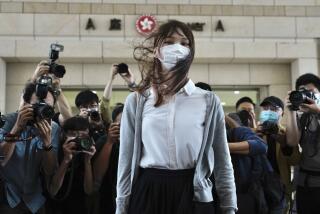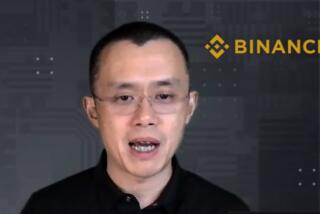Ousted Reformer Zhao May Be on Way Back in Beijing : China: The ex-party chief is no longer under house arrest. His political rehabilitation is reportedly under way.
- Share via
BEIJING — Zhao Ziyang, the former Communist Party chief and reformist ousted during last year’s crackdown on dissent, has been released from house arrest and appears set to resume political activity, sources said Tuesday.
For more than a week, rumors have circulated in Beijing and Hong Kong that senior Chinese leader Deng Xiaoping has authorized Zhao to make provincial “inspection” tours to study the state of China’s economic reforms.
“Apparently he is already going out on an inspection trip,” a U.S. official in Washington said Tuesday. “I tend to think it’s a credible account, that he’s going out on some inspection assignment.”
This official said he believes Chinese leaders are struggling to find a compromise solution to Zhao’s fate.
Zhao was accused last year of “splitting the party” by opposing the June military crackdown on pro-democracy student demonstrations. Some analysts thought he might be put on trial. Now, even a partial rehabilitation would mark a major step forward for reformist forces in China.
An English-language Hong Kong newspaper, the South China Morning Post, on Tuesday quoted an unidentified U.S. official in Washington as saying that members of a Chinese mayors delegation now visiting the United States had confirmed that Deng “was planning to send Zhao on an inspection mission through China.”
The delegation is headed by Shanghai Mayor Zhu Rongji, a strong advocate of market-oriented economic reform who is widely viewed as a potential leader at the national level. The confirmation of Zhao’s freedom and travel plans came at a luncheon for the delegation hosted in Washington over the weekend by prominent Hong Kong businessman Eric Hotung, the newspaper said.
Deng “made the decision to release Zhao from house arrest after investigations into the latter’s (alleged) complicity in last year’s democracy movement had yielded no incriminating evidence,” it reported.
Zhao, 70, is widely believed to have been living in recent months under guard in a tree-shaded compound off a narrow lane near central Beijing. Guards sometimes appeared in the alleyway to examine suspicious passers-by. When a foreign reporter walked by the house Tuesday evening, entryway lamps lit the massive red doors to the compound but the lane was quiet and no guards were in sight.
The Mirror, a China-watching magazine in Hong Kong, quoted anonymous sources as saying Deng wants Zhao to return formally to government work late next year.
There have also been indications that Bao Tong, 58, a close Zhao aide who served as his political secretary and head of a Communist Party think-tank on political reform, has been moved from the maximum-security Qincheng Prison to more comfortable confinement at a Communist Party guest house in Beijing.
“Chinese sources said investigations into Bao’s alleged involvement in the ‘counterrevolutionary rebellion’ last year had yielded no incriminating facts,” the South China Morning Post reported.
Beijing Mayor Chen Xitong, a prominent hard-liner, accused Bao in an official report last summer of having been a “black hand” behind the protests. Bao was suspected of leaking sensitive information to student leaders occupying Tian An Men Square.
Zhao was last seen in public on May 19 last year when he made a tearful appearance at the square to urge student hunger strikers to end their protest. Zhao warned that “the situation in Beijing can’t go on like this” and pleaded with the students to “understand what a serious point you’ve brought things to.” But the students stayed on, and that evening Premier Li Peng and President Yang Shangkun publicly called on the army to end the protests.
Beijing residents swarmed into the streets and erected barricades to block the army’s advance. Two weeks later, on the night of June 3-4, the army finally shot its way into the city center, killing hundreds, perhaps thousands, of people in crowds that sought to block the troops.
Former Shanghai party chief Jiang Zemin was soon named to replace Zhao as general secretary. Since then, Jiang has been designated the “core” of the successor generation of leadership, but many foreign and Chinese observers believe that neither Jiang, 63, nor Li, 61, are credible successors to the 85-year-old Deng.
Zhao’s re-emergence into public life would present a new challenge to hard-line leaders who backed the military crackdown. Deng himself is believed to have ordered the use of the army to end the protests. But for many years before that, Deng was Zhao’s patron.
“The basic line (of the Chinese leadership) is still that the June 4 (1989) events were correctly handled,” the U.S. official in Washington said. “But if they rehabilitate Zhao Ziyang and Bao Tong, that’s quite a threat to that judgment.”
Freedom to travel around China could provide Zhao an opportunity to renew contacts with party, government and military leaders in the provinces, many of whom may hold higher regard for him than for other successor-generation leaders in Beijing.
Some analysts believe that Zhao, who more than anyone but Deng can take credit for China’s economic successes in the past decade, could still emerge as the nation’s top leader.
“Deng is going to die,” a European diplomat in Beijing commented Tuesday. “Who is the successor to Deng? That’s the real question today. Certainly not Li Peng. Certainly not Jiang Zemin. Those guys are too young. You need someone in their 70s. Who? There’s only one left.”
Holley reported from Beijing and Mann from Washington.
More to Read
Sign up for Essential California
The most important California stories and recommendations in your inbox every morning.
You may occasionally receive promotional content from the Los Angeles Times.













